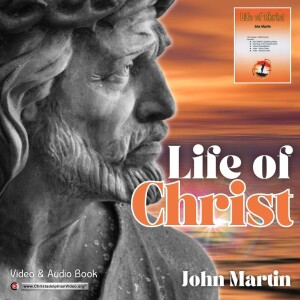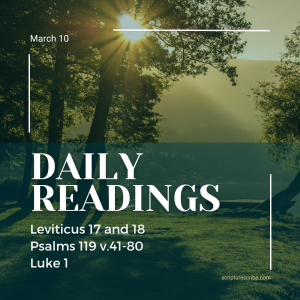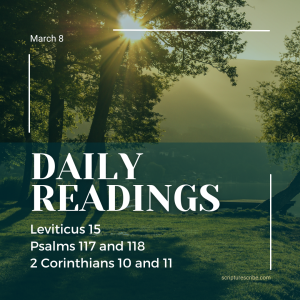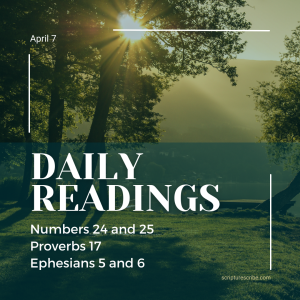Episodes

20 minutes ago

Friday Jan 16, 2026

Friday Jan 09, 2026
Friday Jan 09, 2026
The Life Of Christ # 119 Is it lawful to heal on the sabbath day by John Martin

Friday Jan 09, 2026

Wednesday Jan 07, 2026
Wednesday Jan 07, 2026
Abram's spurning of the powerful king of Sodom meant that he now had a mighty foe. The Almighty encouraged Abram with the comfort that He was Abram's protector and in Yahweh he would berecompensed for his faithfulness. Abram's age has advanced by about 10 years since the promise of chapter 12 and as yet he has no "seed", "heir". His faithful steward, Eliezer from Damascus was his nominated heir. The LORD says, this man cannot be your heir - it must be a son born from you. Abram is brought out into the brilliant night sky and told that his offspring will be as numerous as the stars. We are told a great truth about how God counts belief as righteousness (verse 6). It should be read, "Abram believed God, and it was counted to him for righteousness". Believing God vastly exceeds mere belief IN God - see James 2verses18-26). Yahweh then cut a covenant with Abram as proof that the Almighty had vouchsafed the covenant that would be sealed by the offering of the Lord Jesus Christ some two thousand years after the death of Abram. Abram was told that his descendants would be afflicted for 400 years as strangers in a land that was not theirs. This culminated in their deliverance from Egypt atprecisely the time predicted, even on the same day that the LORD had spoken to Abram (Exodus 12verses40- 41; the 430 years refers to the time of the promise {the difference in years refers to 30 years prior to the affliction commencing}). Genesis 16 speaks of Abram and Sarai's attempt to circumvent the Almighty's way to fulfill the promise. It involved Abram taking a concubine, Sarai's maid (most likely acquired in Egypt) to produce an heir to Abram. The situation led to Hagar vaunting herself against her mistress Sarai.The disruption brought to Abram's household caused the divine command for Abram to cast out the bondswoman and her son (the literal event being a parable explained by the Apostle Paul in Galatians 4verses21-31). Hagar together with her son were rescued by the angel of the LORD; and she was told to humbly submit to her mistress. There will be some material blessings to Ishmael, as he is Abram's son. The chapter concludes by telling us that Abram is now 86 years old.Psalm 18 is a Psalm in which David exalts and celebrates the deliverance from Saul he has received from his majestic and dependable deliverer - Yahweh. It is Yahweh's consistency as the Father, the Rock that anchors our lives. David uses wonderful poetry and figurative language in which he describes his God.This language is inspiring. Yahweh is described as riding upon the storm clouds, which serve as His cherubic chariot. Yahweh is described as David's "Rock", meaning a large, unmoving rock. Moses had ascribed this characteristic to his God in his great song in Deuteronomy 32verses4 - stop for a moment to read this. Then pause and contemplate. The reason his Omnipotent Sovereign has wrought mercy, faithfulness and deliverance for David was David's steadfast love of and faithfulness to his God; and the kindness and mercy demonstrated to his fellow humans. Jesus taught us to ask for forgiveness, insofar as we have been prepared to forgive others. If you want to be froward (that is, to be tricky, or and wrestle with God); you will be dealt with according to the same measure; and will find that when wrestling against God's values.When we enter into a contest with the Almighty that will be one contest which we can never win. A divine principle is that we reap what we sowverses Galatians 6verses6-9. The greatest key to living an acceptable and godly life is "meekness", or "teachableness" - note our Lord Jesus' words in Matthew 5verses5 (quoting the entire context of Psalm 37; particularly verses 9-11); and James' comments 1verses22-27; 3verses17-18. Without humbleness of mind, we are bound to always fail (James 4verses6-10; 1 Peter 5verses5-11. Please stop and read aloud Psalm 18 verses 20-30. With these values guiding our life we will eventually emerge victorious. Pause and ponder.
In Matthew 10 the twelve Apostles are instructed and commissioned to heal and proclaim the gospel within Israel. They are warned of persecution and opposition, but urged to courageously fulfil their charge. The Gospel will polarise people's responses, even within families. Finally, they are told that a reward awaits those who support the preaching of the "good news". Matthew 10 teaches us that if we love thepresent life more than the future life, we will be disappointed; by contrast, God will reward present sacrifice with eternal life. This important principle of - "love life you will lose itverses lose life and you will find it" is stated in 5 places in the Gospels, corresponding to 3 separate occasions! It must be important!
Thanks for joining us - we pray you found these comments helpful in your appreciation of God's words, join again tomorrow

Tuesday Jan 06, 2026
Tuesday Jan 06, 2026
When Abram left Haran, it was with a multitude of people and many goods. These had increased greatly during his sojourn in Egypt. The same things were true for his nephew, Lot, and contributed to the problem told us in the end of chapter 13. Nonetheless Abram had learnt a great lesson in trust; and as an acknowledgment of that we are told in verse 4, "he made an altar and called on the name of Yahweh" (a name with which the faithful were familiar - see Genesis 4verses25-26). The location of this altar was between Bethel (the house of God) and Ai (ruin). His choices would determine whether his life would be ruined, or whether he would dwell with God - this is likewise true for each one of us. The troublesome Canaanites and Perizzites then dominated the land. The multitude of cattle made finding pasture difficult and the large number of people meant arguments were very common. A dispute caused Abram to suggest that they go their separate ways. Abram graciously allowed Lot the choice; and Lot chose the choicest pastures. Lot's choice was influenced by "the lust of his eyes". Abram was contented with trusting in the LORD to provide. The record uses the same words from God to Abram as is used of Lot's viewpoint. What God promised Abram was real estate - the earth (Romans 4verses13) - not a reward in heaven. Jesus taught the same in the Lord's Prayer, "Thy Kingdom come, Thy will be done on earth as in heaven" Matthew 6verses10. And as proof of what God had promised Abram; Abram was asked to walk on what he was to receive (see also Genesis 15verses18-21). Genesis 14 is an account of Abraham's rescue of his nephew Lot, who was takencaptive when a northern confederacy headed by Chedorlaomer - whose name signifies "a bundle of sheaves" - (the famous historical Hammurabi). The account is a literal event, but also symbolic of the nearing conflict of Armageddon, WW 3. Abram was "in fellowship " - confederate with two Amorites. The victor, Abram was offered rich rewards, which he spurned. The chapter's close sees the King-Priest of Jerusalem Melchizedek offering fellowship through bread and wine with God Almighty (see Hebrews chapters 5, 6 and 7; where the extended parable about the Lord Jesus Christ is explained).In Psalm 17 David seeks vindication from his Omnipotent Creator in whom David has sought and found protection in distress and constant care. David calls on Yahweh to rise and judge his enemies. But the greatest message from the Psalm is found in David's heartfelt hope, "As for me, I shall behold your face in righteousness; when I awake, I shall be satisfied with Thy likeness" ESV. The resurrection will bring the realisation of this hope (Philippians 3verses20-21; Colossians 3verses1-5.1 John 3verses1- 3).
The NT chapter commences with the miracle of the healing of a paralytic man and subsequent exposure of the evil thoughts of the enemies of our Lord Jesus Christ. The call of the tax collector Matthew, also known as Levi from his customs house beside the lake in Capernaum (meaning city of comfort, or consolation i.e. the centre of the proclaiming of the gospel in the Galilean region- called by the writer Jesus' own city) where he most likely collected the excise upon the fish undoubtedly earmarked for the Jerusalem market. It was here where a question about fasting arose and was answered. Here he curedthe woman from the issue of blood she had suffered incurably for 12 years. Here he raised from the dead the daughter of Jairus the ruler of the synagogue. On leaving the city he is followed by two blind men who he heals and asks them a charge they fail to respect, to keep the miracle silent. Next, he cures a deaf mute, only to accused by his adversaries of doing this via demonic powers attributed to the lord of the dung heap. The chapter closes with an appeal for more to support the work of reaping a vastly growing harvest. The recurring lesson of this chapter is that healing and forgiveness were - and are - extended by the Lord according to the faith of the disciple.
Thanks for joining us - we pray you found these comments helpful in your appreciation of God's words, join again tomorrow

Monday Jan 05, 2026
Monday Jan 05, 2026
In Genesis 11 we are told, that as humans again multiplied on the face of the earth, they conceived a united plan of open rebellion against their Creator. They sought to build a tower, or Ziggurat, whose height would prevent the human race from being overwhelmed by a flood from God. The plan was stopped by creating confusion through the creation of new languages. This created suspicion and people scattering from the place of rebellion. From verses 10-26 is the record, or genealogy, of Shem's descendants till Terah, the father of Abram (whose name was changed in chapter 15 to Abraham). Verses 27-32 tells us the genealogical details surrounding Terah and Abram. It would appear that in the initial call of Abram to leave Ur of the Chaldeas the initiative was left with the patriarchal family head - Terah - to initially lead the family towards the Promised Land. Chapter 12 tells us, "Now the LORD had said ...". Later information tells us that at this time Abram was about 70 when called to forsake wealth, luxury and social prestige in Ur for an undefined Land (later we find it to be Israel - see Paul's comments in Hebrews 11verses8-9). Again, the Hebrew words for verse 1 are "Go for yourself". Both, Abram's father Terah, and his uncle Nahor, appear to want to settle in Haran - and to not continue their journey to the Land of the Promise. The words of the first 3 verses are a sevenfold promise that from Abram would descend the great nation of Israel. The personal element was to make the name of "Abraham" great in the earth. There was an international promise in verse 3 that blessings would come to all nations through "Abraham's" descendant - the LordJesus Christ (see what that meant in Romans 4verses13). At the age of 75 Abram left Haran without Terah, or his brother Haran. In verse 7 we see that the land of Canaan (Israel) was first promised to Christ (Abram's descendant) before it was promised to Abraham himself. There were great dangers in the Canaanite land. Famine forced Abram and his large group to seek sustenance in Egypt. Here Abram showed a lack of trust in God and told lies about his beautiful wife Sarah, believing that would save his life. God did deliver Abram despite this failure; and taught him that the Almighty can be depended on regardless of theseemingly immense difficulties.
Psalm 14 is an important record, "The fool has said in his heart, there is no God". The Psalm is duplicated in Psalm 53 - an indication of the importance of the message (and is cited in Romans 3). But the message is telling us more than that atheists are foolish. It is not those who simply speak the words; but it applies to those whose actions say, 'I can act as I please and will not be punished'. The heart's intentions are what really counts. Psalm 15 speaks of the character required in order to dwell eternally with the Father in the Kingdom Age. Truthfulness, integrity, not going back on an agreement despite personal cost. The citizen of Zion despises all forms of corruption. Such a person seeks the benefit of others; not the profiting from them. Such upright characters are like their Father. Psalm 16 is about the motive power of the Lord Jesus Christ to resist sin by always pleasing His Father (verse 2 and 9 particularly). It describes Jesus' confidence that his Father would raise him, by resurrection, from the dead (Acts 2verses24-36) read slowly. Pause and ponder.
Matthew 8 is a chapter demonstrating outstanding faith. It commences with the healing of a leper, who has no doubts about our Lord Jesus' power to heal and save, only a question as to whether he would exercise his power then. It is followed by an outstanding example of Gentile faith, shown in an unnamed Roman centurion, whose faith exceeded that of any of the Covenant people of Israel in that epoch, and whose faith Jesus equates to that of the father of the faithful - even Abraham. Our Lord Jesus Christ tells us that this stirred within him the message of the Scriptures when Abraham's children will, on the basis of their identified beliefs, be "the seed" that inherits the earth (Genesis 12verses1-3; Galatians 3; Romans 4verses13).
Thanks for joining us - we pray you found these comments helpful in your appreciation of God's words, join again tomorrow

Sunday Jan 04, 2026
Sunday Jan 04, 2026
In Genesis 9 we read of the LORD's command for this new creation, who had been preserved in the ark with Noah the 8th person (emblematic of Jesus whose name equals 888 in the Greek - compare 1Peter 3verses20-22); "to replenish (or fill) the earth" with this new creation. The fear and dominion of mankind over the lower creatures would be evident. There was a prohibition of eating food with the blood still in it - as the blood was representing life, which belonged to God. There was also a law reinforcing the penalty due to a murderer. Once more the Almighty covenants that He will never again destroy the earth by a flood. The surety of His promise being seen in the rainbow. The offspring from Noah's 3 sons - Shem, Ham and Japheth - peopled the newly refreshed earth. Unfortunately, Noah became drunk, and it seems was sodomised by his son Ham. Noah pronounced a curse on Ham and spoke of a blessing that would come through his son Shem. Jesus Christ came from the Jewish race -Romans 3verses1-2; 9verses3-5. Shem became the ancestral head of the Semitic and Asiatic people; Ham the progenitor of the African people; and Japheth the forbear of the European race. In Genesis 10 we are told of the 70 nations that came from Noah's 3 sons - Shem, Ham and Japheth - see Moses' comment in Deuteronomy 32verses8. There we are told that the number of nations was determined by the Almighty by the number of Israel's (Jacob's) children, who into Egypt (Genesis 46verses8, 27; see also the Apostle Paul's comments to the Athenians in Acts 17verses26).
Psalm 11 tells of Yahweh being in His holy temple and mankind must understand this gives Him the authority to judge the wicked. Habakkuk gives us the take home message which we must ponder - 2verses14, 20.
In Psalm 12 the psalmist muses, 'Why have the humble vanished and suffered oppression. Surely, the Omnipotent Creator cannot tolerate evil. Surely, He must act for the downtrodden against their oppressors. He gives the assurance that He will rise against them in His faithfulness. In the 13th Psalm the writer personal asks, 'How long will it be till the LORD intervenes in support of the writer. The writer declares that failure on the part of his Sovereign to act is a cause for the wicked to boast and vaunt themselves in the world. We see it constantly, but we can be assured that at the appropriate time judgment will be poured out upon the evil - Acts 17verses30-31.
The judgment mentioned in Matthew 7 refers to critical fault finding in others and not the need to show discernment, which is essential for us to exercise, when we judge righteous judgment as we are commanded to do. The askers will receive; the seekers will find; and to the knockers doors will be opened. Our Lord highlights the golden rule - do to others what you would wish them to do for you.
Striving to please God must characterise the disciple's life. The witness of those professing discipleship will be evidenced in their fruit; without which our Lord Jesus Christ and His Father will fail to recognise
their children. Only doers of the Word and not simply forgetful hearers are grounded and established as faith upon the Rock.
Thanks for joining us - we pray you found these comments helpful in your appreciation of God's words, join again tomorrow

Saturday Jan 03, 2026
Saturday Jan 03, 2026
In Genesis 7 Noah is instructed as to what numbers of animals he is to take into the newly built ark. Seven pairs of "clean" animals and two pairs of "unclean" animals were to be taken into the ark. And so, what constitutes a clean, or an unclean, beast was known then. The book of Leviticus gives details of this; and comments will be made when dealing with chapter 11 then. The reason for the difference was that the clean beasts would be for food after the flood; but, for the unclean only two breeding pairs were needed. The LORD brought the animals to Noah. He did not have to go out and get them. When the animals boarded the ark, they did so in divinely appointed pairs - the Hebrew says of them, "the man and his wife". They stood in marked contrast to the immoral world which was soon to be inundated by the waters of the coming flood. Seven days later rain came upon the earth for the first time. It was Noah's 600th year. The waters came from above and below. Yahweh shut the door of the ark on Noah, his wife and his 3 sons and their wives; and the gathered animals. No doubt the turmoil outside the ark would have been heard by Noah and his family during the 40 days of overwhelming rain. But nothing could be done for those who had spurned the opportunity afforded them during the 120 years of Noah's preaching. The mountain tops were covered by the rising waters and all flesh of man and beast outside the ark perished. Unless we're in the ark of God's providing - the Lord Jesus Christ - by baptism we will likewise perish in the impending world judgment.
Chapter 8 tells us that the LORD remembered Noah and now began to dry up the waters from the face of the earth. When the water had subsided and the ark came to rest on mount Ararat, in Turkey; Noah sent forth a raven and a dove to determine the conditions outside the ark. He and his family left the ark, which had come to rest on the Day of Atonement. They had been in the ark for more than a year. In verse 17 the command that had first been given to Adam and Eve to replenish the earth, in Genesis 1verses26, was repeated. It was a new beginning, typically a new creation. It spoke of the new creation in the Lord Jesus Christ. Noah sacrificed to God in thanksgiving for their salvation. Yahweh made a Covenant with the human race to never again destroy the earth by a flood and gave the token of the rainbow to confirm that covenant. Read verses 21-22 aloud slowly; and ponder. The greatest lesson of the flood is Noah's great faith and his unshakable trust in the Almighty - see Hebrews 11verses8.
In Psalm 9 the psalmist recounts the wonderful acts of his Sovereign. He exalts in past deliverances God has granted him. Yahweh is enthroned in the heavens and reigns supremely overall. The psalmist encourages his hearers to join with him in praise of their Omnipotent Lord. The nations are dismayed and all the wicked consigned to everlasting destruction in Sheol - the grave. The Psalm concludes with the word "Selah" meaning, "pause and consider". Psalm 10 speaks of the writer's dilemma at the apparent hiding of Himself from His people. The arrogant of the world boast themselves against their Creator. In their pride and ignorance, they see themselves as invincible; and so, they oppress the poor and the weak. The wicked believe God will never rise in judgment against them. But the psalmist implores God to rise in justice and vindicate His name and take up the cause of the downtrodden. Yahweh will arise and support the fatherless and the oppressed (see Psalm 68verses1-6; James 1verses27).
In Matthew 6 Jesus warns against 3 forms of showy piety prevalent amongst the Pharisees of his dayverses conspicuous giving of alms (charity, prayers designed to impress others rather than heartfelt requests to the Father and attention-seeking fasting. Our Lord tells us that the focus of worship must be internal i.e. our relationship with our Father and should ignore anything external that would impress an audience. The chapter points out that charitable deeds must have their focus on the receiver and not the giver - and the reward being future not present. The same attitude must characterise our prayers. Jesus then provides a model prayer in which the honour and reverence for God must be foremost. When His Kingdom is sought and when His will shall be done. Next in the prayer follows petition for needs (not wants), forgiveness(measured by our capacity to forgive) and deliverance. Advice on fasting, the objective of the treasure we seek, freedom from all anxiety as God knows us loves us and will provide all that we need to bring us into His Kingdom. One day at a time our Father has given us- we leave the worry for tomorrow to Him.
Footnoteverses The Psalms has an introduction in Psalms 1 and 2, and concludes in Psalms 149 and 150. The remaining psalms are divided into 5 books corresponding to the 5 books of the Pentateuch - Genesis,Exodus, Leviticus, Numbers and Deuteronomy. The themes in the psalms in each of these books are reflective of the themes and lessons of those books of the Pentateuch.
Thanks for joining us - we pray you found these comments helpful in your appreciation of God's words, join again tomorrow

Friday Jan 02, 2026




